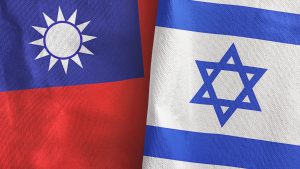Taiwan’s decision to donate to a medical facility located in the illegal Israeli settlement of Sha’ar Binyamin in the occupied West Bank earlier this month sparked a firestorm of controversy. It marked the first time since late 2023 that a foreign state has made such a public display of providing direct financial support for a project inside an illegal Israeli settlement in the occupied West Bank.
At first glance, Taiwan’s aid may appear purely humanitarian. In March and May 2024, Taiwan’s representative office in Israel donated NT$15.9 million (approximately US$500,000) to support medical patrols in Israeli cities and to provide basic humanitarian assistance – such as food, water, and shelter – through an NGO operating in Gaza. However, more recently, Taiwan became the first foreign government to provide funding for a medical center located within an illegal Israeli settlement in the occupied West Bank.
A ceremonial event marking the donation took place in July 2025, attended by senior Israeli officials and Taiwan’s representative in Israel who, by her very visit to an illegal settlement in the occupied West Bank, effectively recognized Israel’s unlawful occupation.
At a press conference on July 22, a spokesperson for Taiwan’s Ministry of Foreign Affairs said that “discussions about the donation were still ongoing and centered solely on humanitarian and medical cooperation.”
The West Bank, where the settlement regional council of Binyamin is located, is an occupied territory under international law. The establishment and expansion of Israeli settlements in the Occupied Palestinian Territory (OPT) are illegal under the Fourth Geneva Convention, which among other provisions protects civilian populations in occupied territory. These settlements thus constitute a war crime.
The illegality of Israeli settlements has been reiterated by the United Nations, the European Union, and numerous international NGOs, including Amnesty International and Human Rights Watch. Most notably, the International Court of Justice (ICJ), which in 2004 already found that Israeli settlements are contrary to the Fourth Geneva Convention, affirmed the illegality of Israel’s occupation of the OPT in its July 2024 advisory opinion. The ICJ concluded that:
[A]ll States are under an obligation not to recognize as legal the situation arising from the unlawful presence of Israel in the Occupied Palestinian Territory. They are also under an obligation not to render aid or assistance in maintaining the situation created by Israel’s illegal presence in the Occupied Palestinian Territory.
Support or aid to any infrastructure projects in the settlements, even under the guise of medical donations, contributes to the maintenance and entrenchment of unlawful Israeli occupation.
Any support provided to Israeli settlements, including medical care, should also be seen in the context of Israel’s decades-long systematic and institutionalized discrimination against Palestinians, including in access to healthcare, which has resulted in stark health inequalities between Palestinians and Israelis. Compounding this inequality are Israel’s arbitrary restrictions on Palestinian freedom of movement, ability to access clinics and adequate healthcare. Just in recent months, Israeli authorities have repeatedly obstructed West Bank Palestinians’ access to life-saving healthcare, at times with lethal consequences.
When Taiwan chooses to fund projects that exclusively serve Israeli settlers – Palestinians are barred from living in Israeli settlements – it contributes to legitimizing and maintaining Israel’s system of apartheid. This is not only a violation of international law, but also undermines Taiwan’s own image as a democracy rooted in human rights and equality.
The grim reality on the ground sharply contrasts with the statements of Taiwan’s representative in Israel, Abby Ya-Ping Lee. At the event celebrating the medical center in the settlement, Lee said: “We are pleased to expand this cooperation to the regional level, through initial work with a regional council to save lives and to ensure the right to health regardless of ethnicity, age, or gender.” The very settlement enterprise that this donation supports and empowers is rooted in national, racial and ethnic domination over Palestinians.
Israeli authorities continue to systematically and deliberately destroy or damage the healthcare sector in Gaza and deny or obstruct the entry of essential medical provisions. Israel also adopts unlawful measures that result in the erosion of the Palestinian healthcare system in the occupied West Bank, including East Jerusalem. Taiwan must take a principled and rights-based approach – which would look like supporting Gaza’s decimated healthcare system and Palestinian healthcare facilities facing severe challenges in the West Bank, rather than investing in infrastructure serving illegal settlements. Donations, even in the guise of humanitarian aid, to illegal Israeli settlements in the OPT only serve to make them sustainable, thus entrenching a violation of international law.
Taiwan has long sought greater international recognition and has positioned itself as a defender of liberal values, democratic governance, and global solidarity. These aspirations should extend to its foreign aid strategy. If Taiwan is to be seen as a responsible and genuine global actor, it must ensure that its humanitarian assistance – especially in conflict zones – is neutral, impartial, transparent, and consistent with international legal norms.
In conflict zones where aid is often politicized, humanitarian neutrality is not a luxury – it is a mandatory and an international obligation. Taiwan’s well-intentioned support can have meaningful impact, but only if it is grounded in impartiality and a commitment to upholding international law.
This is not just about diplomacy; it is about ensuring that Taiwan’s actions abroad reflect the values it upholds at home and ensuring that it does not engage in actions that could risk Taiwan being complicit in Israel’s violations of international law.

































